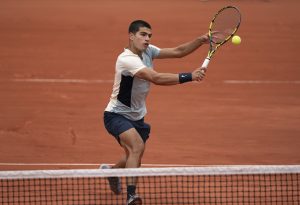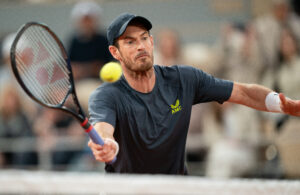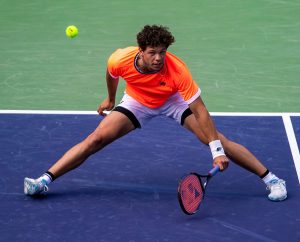One of the many ripple effects of Novak Djokovic’s last-match defeat in pursuit of the Calendar Grand Slam is that, for the time being at least, Roger Federer remains tied with Djokovic and Rafael Nadal on 20 Majors. Given that it is now nearly four years since Federer won his last Major (the 2018 Australian Open), that is extraordinary, and a testament to the considerable lead in Grand Slam titles that he had built up over his much younger rivals before they finally caught up with him. But the position of the great Swiss right at the top of the men’s game will surely not last for much longer, which is why he should seriously consider retiring from tennis now, while he is still at least tied at the top.
Of course Federer himself has absolutely no intention of quitting. As reported in several publications this week, including “The Bible of Billionaires” Forbes Magazine (which itself is a testament to the incredible fortune that Federer has amassed over two decades of playing tennis), Federer recently made a statement to the TV channel SFR Sport in his native Switzerland: “The worst is behind me.” He was referring to the numerous injuries that have dogged him in recent years, but after months of intensive physical rehabilitation he expressed great confidence that he would return to the ATP Tour in 2022.
Nevertheless, despite his own desire to continue playing into his fifth decade, Federer really should consider whether it is wise to go on trying to defy both Father Time and his much younger competitors—-not just Nadal and Djokovic, who are five and six years younger than him respectively, but the next wave of great players behind them, spearheaded by Daniil Medvedev, the new US Open Champion, who is an astonishing 15 years younger than him. Although Federer believes that “The worst is behind me,” he should heed the infinite wisdom of Shakespeare, who wrote in King Lear (his great tragedy about aging and its effects): “And worse I may be yet. The worst is not/So long as we can say ‘This is the worst.'”
Just in case Federer and his many fans have forgotten how bad it has been for him recently, it is worth recapping the misfortunes that have plagued him in the last two years, problems that predated the pandemic but which were then made much worse by it. The biggest problem of all, obviously, is the deterioration in his physical condition, as demonstrated by the fact that he has spent more time off the tour in the past two years than he did in the previous 20 years combined. Having almost miraculously avoided serious injury for so long, with his sole extended lay-off coming when he missed the second half of the 2016 season, he has barely played at all in the last 18 months. The inevitable consequence has been that even he, the most rhythmically brilliant tennis player there has ever been, has struggled to find any kind of rhythm in the few matches that he has played.
And with physical deterioration has come the inevitable deterioration in form. That reached a nadir in his last match, the straight-sets defeat against Hubert Hurkacz in the Wimbledon quarterfinal, which culminated in what would once have been unthinkable–Federer being bageled in the third set on the Centre Court that he once made his own. Hurkacz is a fine player, proving it by winning the Miami Masters earlier this year as well as making the last four at Wimbledon, but he still has a long way to go before he can truly be considered one of the tennis elite. So, one shudders to think what Nadal, Djokovic, or Medvedev might do to Federer if they come up against him in a Major.
Ironically, Federer’s utter adoration of tennis, the sport that he has graced for so long and raised to a state of grace that no other player has ever matched, may ultimately be his undoing. Unlike even some of his fellow Major-winners, notably Andre Agassi and Pat Cash, Federer is not remotely ambivalent about tennis, famously loving everything about it–the competition, the locker room, even the travel–nearly a quarter of a century after he made his ATP Tour debut. Where other players, including his own hero Pete Sampras, clearly tired of the sport, particularly when their physical fitness and form began to decline, Federer apparently remains as entranced as ever by the sporting and indeed artistic possibilities that only tennis can provide.
However, set against that all-consuming love of the game should be some concern for his own game and his own reputation. The fact is that Federer has now surely lost forever all chance of winning the one important piece of silverware (at least in his own mind) that he has never won, namely the Olympic Singles title, after he was forced to withdraw from the delayed Tokyo Games this summer. All that is really left for him now is to win yet another Major, to add to the 20 that he has already amassed. But the chances of him winning one of the four Majors on offer every year look almost as remote as his winning an Olympic Singles title in Paris in three years’ time, as even John McEnroe, one of his greatest admirers, reluctantly conceded after the thrashing by Hurkacz at Wimbledon.
Of course, Federer has defied the odds and the doomsayers before, but that was nearly five years ago, when he enjoyed his own late, great period as a tennis player and a sporting artist. While he was absent from the tour for the second half of 2016, he brilliantly remodeled his backhand, so that in Melbourne in 2017 he could finally go toe to toe with Nadal, his arch-rival, who he had last beaten in a Major Final nearly 10 years earlier (Wimbledon 2007). His Melbourne magic culminated in the five-game streak, from 3-1 down in the fifth set, that may be the single greatest set (or near-set) of play not only in his own career but in any tennis player’s career. And then, for good measure, he won two of the next three Majors that he played over the next year–Wimbledon in 2017 and Australia again in 2018–to take him to the then historical high-water mark of 20 Majors.
In an ideal world, which of course is far from the one we live in, Federer might have retired then, when he was completely triumphant once again. Indeed, less than a month after winning the 2018 Australian Open, he won the tournament in Rotterdam to go back to World No.1, for the first time in nearly five years. But of course it would have taken extraordinary self-control, if not self-denial, to quit at the top once he had got back there after so long.
Since the early months of 2018, it has been virtually downhill all the way for Federer: losing from two sets up against Kevin Anderson in the 2018 Wimbledon quarterfinal; losing to Djokovic in the 2019 Wimbledon final despite having two match-points; and then the last 18 months of injury, thwarted comebacks and thrashings of a kind that he and his fans could never have imagined in the past.
As he plans yet another comeback, Federer may well look to Tom Brady for inspiration. Brady, of course, is the almost equally legendary Tampa Bay Buccaneers quarterback, who won an extraordinary seventh Super Bowl earlier this year to go alongside the magnificent half-dozen that he had won previously with the New England Patriots. At 44, he is even older than Federer, but the innumerable metrics used in the NFL (there are even more stats in American football than there are in tennis) suggest that he is playing better in his mid-forties than he was in his mid-twenties. However, there are two key differences between Federer and Brady. The first is that the NFL season only lasts for less than half the year, in complete contrast with the almost unending, year-round demands of the ATP Tour. And the second, which is even more pertinent, is that Brady, for all his own undoubted greatness, plays a team game, and specifically a team game where he has a veritable army of younger, fitter, bigger team-mates whose main aim is to protect him from being hit by onrushing opponents.
Roger Federer has no such defense against the opponents coming at him from all sides. That is why, for all his utterly commendable devotion to the sport that he has elevated to previously unimaginable heights over the last two decades, he should seriously consider calling it a day. If he does so now, or at some point before the 2022 Australian Open, then he can still somehow retire while he is at least tied at the top. It would mean that, when he retired, he still shared the title of being the statistically most successful male player ever, to go alongside the title that he will surely always hold, of being aesthetically the most successful tennis player, of either gender, ever.
Main Photo from Getty.






